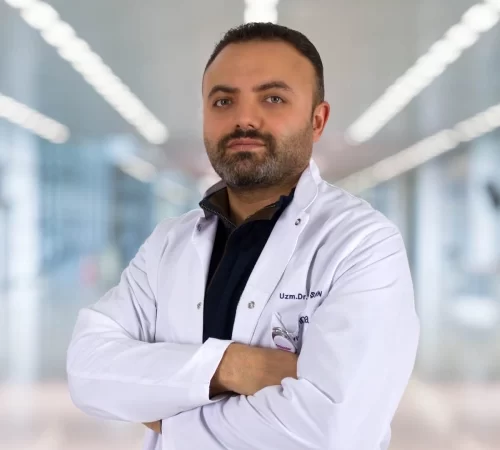Internal medicine is a medical specialty or a medical branch for treating and diagnosing various diseases affecting internal body organs, such as the heart, kidneys, lungs, liver, and others. Patients who are suffering from liver disease, blood diseases, diabetes, kidney disease, gastrointestinal diseases, hormone problems, respiratory problems, infectious diseases, and obesity must apply to the Internal Medicine Department.
However, in view of the development and progression of these diseases, they can be discovered and treated in early stages before they worsen via engaging several tests, including physical examination, laboratory tests including; (blood test, urinalysis, stool (feces) analysis) ultrasound; (x-rays, CT scan, MPS, MRI, etc.), endoscopy (Gastrointestinal Endoscopy), Heart tests (Echo tests, ECG, angiography), and other tests needed to discover and diagnose the main health problem to find out which treatments should be applied to the patients
The Internal Clinic at Avicenna / Atasehir International Hospital offers all the necessary services over 24 hours for all patients in every age group. Besides, using the latest technology with modern medical devices to diagnose the disease in its very early stages even when the patients do not show all the symptoms, taking into account the age, sex, and genetic factors when applying any treatment.The Internal Medicine Unit includes:
- Gastrointestinal diseases
- Nephrology
- Rheumatism
- Blood diseases
- Medical Oncology
- Hypothyroidism
- Respiratory infections asthma and bronchitis
- Fatigue
- Diabetes
- Hypertension
Gastrointestinal diseases
It includes all the digestive disorders, which are detected and treated in light of modern medical technologies such as performing gastroscopy and colonoscopy
- Peptic ulcers
- Gastritis
- cholelithiasis
- Biliary colic
Also, many other diseases such as internal gastrointestinal bleeding can be diagnosed easily and patients can achieve treatment in a short time. In addition, to the upper and lower endoscopic examinations of the gastrointestinal system. However, the diagnosis of the diseases is confirmed through a CT scan and ultrasound examinations.
Some of the diseases and conditions that are diagnosed and treated in the Internal Medicine Unit:
Acute Respiratory Infections
It can be divided into two parts; The upper respiratory tract infections which affect (sinuses, nose, and throat), and the lower respiratory tract infections which affect (trachea, lungs, and bronchial tubes), usually caused by a virus during the autumn and winter seasons. Therefore, symptoms may vary depending on which system is affected.
Infectious Diseases
it involves a wide range of diseases such as skin infections, hepatitis, diarrhea, inflammatory diseases of the bones and joints, parasitic diseases, sexually transmitted diseases, influenza, and Brucellosis are diagnosed in internal medicine clinics. However, providing an isolated environment for these cases to prevent contamination during treatment.
Hypertension
It is also known as” High blood pressure”. Hypertension condition occurs when the blood pressure inside the body exceeds the normal values. However, The systolic blood pressure should be less than 140 mmHg and the diastolic blood pressure should be less than 90 mm Hg in adult individuals. Once the blood pressure is higher than these values, then this indicates a disease called hypertension. Moreover, It causes many problems such as blood vessel damage and bleeding, brain hemorrhage, kidney damage, and stroke. The treatment of hypertension aims to reduce these diseases as well as to reduce heart attacks.
Diabetes
A disease identified by high blood sugar levels. The levels of blood sugar are regulated by hormone actions called insulin. However, Diabetes occurs due to insufficient secretion of insulin, insulin resistance, or both. According to the type of diabetes, treatment may require drugs to make insulin more influential, slow glucose absorption from the gut, increase production of insulin, or daily insulin injections. As a result, lifestyle changes, such as exercise, dietary changes, and weight loss may also be effective.
Hypothyroidism
Thyroid hormones T3 and T4 secreted from the thyroid gland have many important functions, especially the regulation of the body’s metabolic rate and body’s energy. Therefore, when this gland fails to produce enough amounts of these hormones, the metabolism of the body slows down. The problems with disrupted hormonal balance include fatigue, weight gain, dry skin, tiredness, inability to stay warm.
Although, it may results sometimes in thyroid cancers and autoimmune diseases may occur due to insufficient or deficient thyroid hormones. Therefore, thyroid diseases must be treated to bring back sufficient hormone levels
High blood cholesterol and triglycerides
Due to unhealthy and imbalanced nutrition, genetic factors and chronic diseases, levels of cholesterol and triglycerides in the blood may be higher than normal. The elevations in these parameters appear in routine blood tests, advanced elevations may present with symptoms such as the formation of sebaceous glands around the eyes. However, If blood lipids are not controlled with medication or nutritional therapy it may increase the risk of stroke and heart attack. Therefore, the treatment may involve weight loss, exercise, and a low-fat diet.
Gastrointestinal diseases
Diseases such as hepatitis, cirrhosis, liver cysts, gastroesophageal reflux disease (GERD), gastritis, ulcers, and hiatal hernia. cholecystitis and Gallstones.
Pulmonary diseases
Diagnosis and treatment are performed in internal medicine clinics for several pulmonary diseases including asthma, chronic obstructive pulmonary disease, pneumonia, bronchitis, and fluid accumulation in the pleura. Also, Lungs inflammation due to infection with viruses, bacteria, or other microorganisms
Kidney disease
Kidney infections, stones, cysts, and acute or chronic disorders are serious health problems that need early treatment before they can progress to permanent organ damage.
Anemia and other blood diseases
Low levels or lack of enough red blood cells that carry iron, hemoglobin, and hematocrit is called anemia. The most common reason is an insufficient intake of iron, vitamin B12, and folic acid in the body as a result of insufficient and imbalanced nutrition. In addition, there are several types of anemia, including sickle cell anemia, thalassemia, iron deficiency anemia, aplastic anemia blood clotting disorders, bleeding, and bone marrow-related diseases.
Rheumatic Diseases
It includes many health problems and diseases resulting from the autoimmune system attacking healthy tissues, including muscles, joints, ligaments, and tendons. However, the bones are also affected by inflammation resulting from arthritis.
Musculoskeletal diseases
Part of rheumatic diseases and osteitis (calcification) may affect any part of the muscles or bones of the body.
The above-mentioned diseases are health problems that fell into the field of general internal medicine. However, patients attend internal medicine clinics whether they have digestive problems, abdominal pain, cough, or lack of appetite. Therefore, the general aim of internal medicine is to evaluate, diagnose, and treat the patient’s health problem.
Internal Medicine Physicians
A doctor specializing in internal medicine is called an Internists, who is trained to subsequently diagnose, treat and prevent a wide range of diseases and problems that affect individuals. Therefore, Internists are experts in diagnosing health and medical problems that may occur in different areas of the body simultaneously. In addition, an Internists can determine whether a patient needs a surgical intervention or not after diagnosing him/her and conducting the necessary tests.
What do the Internists deal with?
They deal with patients who are suffering from upper and lower respiratory tract infections, diabetes, infectious diseases, rheumatic diseases, and gastrointestinal diseases. Also, high blood pressure, thyroid disorders, and kidney problems are also diagnosed by Internist, as well as influenza, pneumonia, bronchitis, asthma, COPD, and coronary heart disease.
Moreover, they can diagnose and treat blood diseases, hemophilia, obesity, gout, Osteoporosis, arthritis, hepatitis, anemia, cancer, and heart diseases such as high blood pressure and heart attacks. However, depending on the patient’s medical history and complaints, some necessary tests are performed to explain the problem. In this context, it includes the following tests:
Laboratory tests such as blood, urine, and stool analysis, radiological examinations such as X-rays, ultrasound, CT scan, and MRI, endoscopic examinations, which include endoscopy of the upper gastrointestinal tract and colon. In addition to a cardiac examination such as an ECG and echo, and angiography. Furthermore, the diagnosis, treatment, and therapeutic procedures are made as a result of these tests.
What are the health problems that are diagnosed and treated by the Internal Medicine Unit?
- Influenza
- Pneumonia
- Acute respiratory infections
- Chest pain
- Asthma
- Bronchitis
- Hypertension
- Heart disorders
- Heart attack
- Coronary Heart Disease
- Diabetes
- Goiter
- Ulcers
- Stomach infections
- Gastric Ulcers
- Menopause
- Liver diseases
- Gallbladder diseases
- Kidney diseases
- Stomach ache
- Constipation
- Diarrhea
- Cholecystitis
- Appendicitis
- Anemia
- Hemophilia
- Obesity
- High blood cholesterol and triglycerides
- Gout
- Osteoarthritis
- Osteoporosis
- Urinary tract infections
- Fatigue
- Migraines
- Liver Inflammation
- Abscesses
- Hypothyroidism
- Cancer
- Rare diseases
INTERNAL DISEASES
In parallel with scientific and technological developments in today’s modern medicine, the Department of Internal Medicine continues to be the first point of application and a direct solu- tion center for all non-surgical complaints of the adult patient group, with many side-by-side departments.
In our preoperative and postoperative periods, the follow-up of many patients is carried out by the internal medicine depart- ment by our specialist physician and these processes are comp- leted smoothly.
- Thyroid Diseases
- Blood Diseases and Diabetes
- Insulin Resistance Diagnosis and Treatment * Rheumatic Diseases
- Gastroenterological Diseases
- Liver Diseases
- Osteolysis Treatment
ENDOSCOPY
This method entails visual feedback via endovision-camera sys- tem utilized for diagnostic evaluation of stomach, intestinal, lung and bronchial system.
Procedures such as colonoscopy, gastroscopy, fiberoptic flexible broncoscopy and endoscopy are carried out to assits in biopsy and diagnosis.

M.D. Alper Daskin
İnternal Medicine




